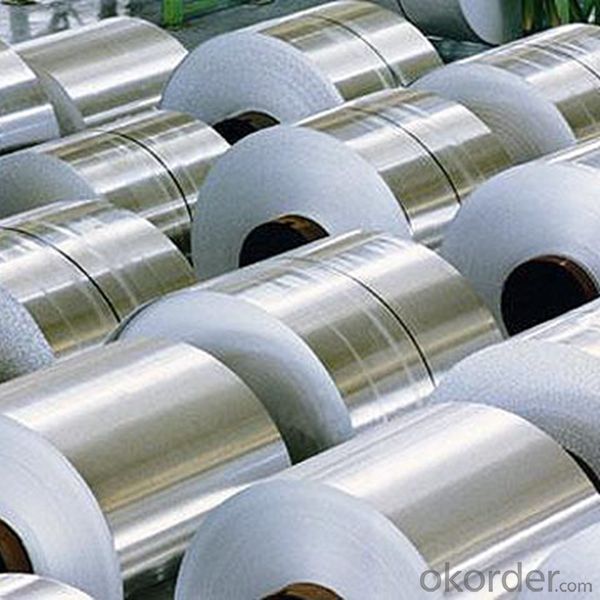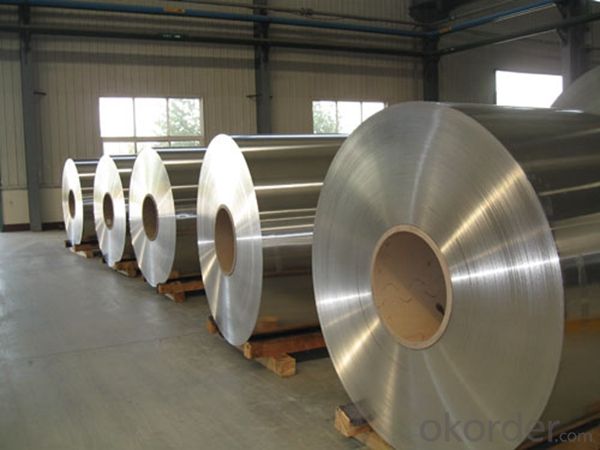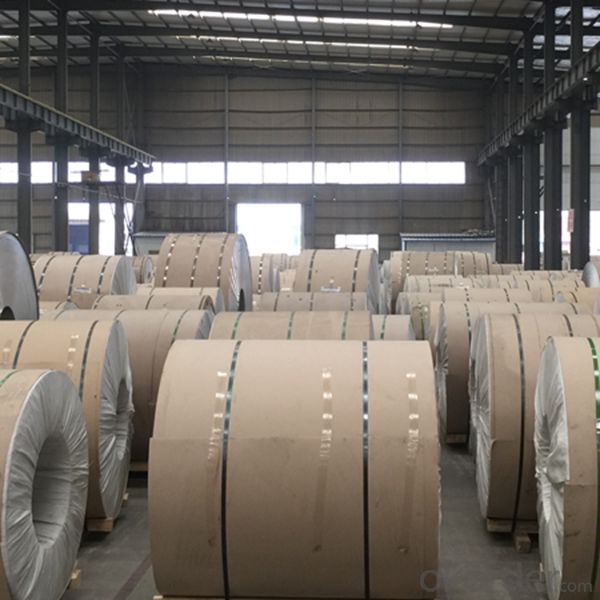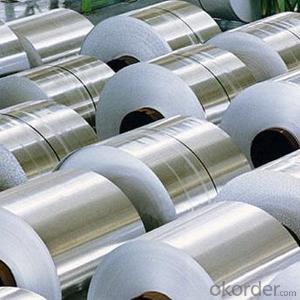Mill Finish Aluminium Coil AA1200 H14 for Building
- Loading Port:
- Shanghai
- Payment Terms:
- TT OR LC
- Min Order Qty:
- 5 m.t.
- Supply Capability:
- 10000 m.t./month
OKorder Service Pledge
OKorder Financial Service
You Might Also Like
Item specifice
1. Specification of Mill Finish Aluminium Coil AA1200 H14 for Building
Name | Aluminum Coil |
Brand | CNBM |
Alloy | 1100H-18, 3003-H24,3003-H26,3005-H26,8011,3004,3105,5005,etc. |
Thickness | 0.1~1.5mm |
Width | <2000mm< span=""> |
MOQ | 1 MT |
Coating finish | Brushed, drawing, embossed, printing |
Color | As to code RAL |
Surface | Embossed,Mill Finish,Coated,Brushed |
Gloss | 10-90%(EN ISO-2813:1994) |
Total coating thick | PVDF27 ~35micron |
Polyester18~27micron(EN ISO-2360:1995) | |
Coating hardness | 2H |
Adhesion | 5B (EN ISO-2409:1994) |
Impact resistance | No cracking and peeling (A.S.T.M D2794-1993) |
Flexibility (T-bend) | 0T- 2T |
MEK resistance | 100 |
Certification | ISO9001:2000, CE, SGS |
Coil's standard diameter | 1100mm |
Inner Diameter | 405mm/505mm |
Coil's standard weight | 1MT - 2MT |
2. Application of Mill Finish Aluminium Coil AA1200 H14 for Building
(1).Interior: wall cladding, ceilings, bathrooms, kitchens and balconies, shutters, doors...
(2).Exterior: wall cladding, facades, roofing, canopies, tunnels,column covers , renovations...
(3).Advertisement: display platforms, signboards, fascia, shop fronts...
3. Feature of Mill Finish Aluminium Coil AA1200 H14 for Building
*Such coil is specially designed to replace aluminum ingot, due to the high export tax of aluminum ingot, the coil has better price than ingot.
*This type of coil can fit customer's remelting furnace just like ingot, no need to make any change to the production line that was previously used for ingot. The standard coil size and weight is very suitable for the feed gate of furnace.
*This type of coil causes less material wastage than ingot when remelted.
*Our coil is made directly from ore, no need to go though the ingot making process, quality is much better than other suppliers who use ingot scrap to make coil.
Be free from Oil Stain, Dent, Inclusion, Scratches, Stain, Oxide Dicoloration, Breaks, Corrosion, Roll Marks, Dirt Streaks and other defect which will interfere with use
4. Certificate:
SGS and ROHS(if client request, paid by client), MTC(plant provided), Certificate of Origin(FORM A, FORM E, CO), Bureau Veritas and SGS (if client request, paid by client), CIQS certificate
5. Image of Mill Finish Aluminium Coil AA1200 H14 for Building



6. Package and shipping of Mill Finish Aluminium Coil AA1200 H14 for Building
eye to wall
eye to the wall
with wood pallet (wooded case also available)
7. FAQ
1) What is the delivery time?
Dpends on actual order, around 20 to 35 days
2)What is the QC system:
We have QC staff of 20 persons and advanced equipment, each production is with MTC traced from Aluminum ingot lot.
3) What market do you mainly sell to?
Australia, America, Asia, Middle East, Western Europe, Africa etc
- Q:How are aluminum coils used in the automotive industry?
- Aluminum coils play a crucial role in the automotive industry due to their numerous advantages over traditional materials. These coils are widely used in various parts and components of vehicles to enhance performance, improve fuel efficiency, and reduce overall weight. One of the primary applications of aluminum coils in the automotive industry is in the manufacturing of heat exchangers, such as radiators and condensers. Aluminum's excellent thermal conductivity allows for efficient heat transfer, helping to regulate the engine temperature and optimize its performance. By using aluminum coils in heat exchangers, vehicles can achieve better cooling efficiency, which is essential for preventing engine overheating and maintaining optimal operating conditions. Additionally, aluminum coils are used in the production of air conditioning systems, particularly in the condenser and evaporator units. These coils provide excellent heat exchange capabilities, allowing for efficient cooling or heating of the vehicle's interior. As a result, vehicles equipped with aluminum coil-based air conditioning systems can provide a comfortable environment for passengers while minimizing energy consumption. Moreover, aluminum coils are utilized in the construction of lightweight body panels and structural components, such as doors, hoods, roofs, and chassis. Aluminum's high strength-to-weight ratio makes it an ideal material for reducing the overall weight of vehicles without compromising structural integrity. This weight reduction leads to improved fuel efficiency, reduced emissions, and enhanced performance, including acceleration, handling, and braking. Furthermore, aluminum coils find application in the production of electrical systems in automobiles. Due to their excellent electrical conductivity, these coils are used in wiring harnesses, connectors, and other electrical components. The use of aluminum coils in these systems ensures efficient transmission of electrical signals and reduces the overall weight of the vehicle, contributing to improved fuel economy. In summary, aluminum coils are extensively utilized in the automotive industry for various applications, including heat exchangers, air conditioning systems, body panels, and electrical components. Their exceptional properties, including thermal conductivity, strength-to-weight ratio, and electrical conductivity, enable automakers to produce lighter, more efficient, and environmentally friendly vehicles.
- Q:Can aluminum coils be used in the production of aluminum curtain walls?
- Indeed, aluminum coils possess the capability to be utilized in the fabrication of aluminum curtain walls. In the manufacturing procedure of aluminum curtain walls, it is customary to employ aluminum coils as the primary material. These coils are subjected to various processes, such as rolling, cutting, and shaping, in order to fashion the desired components of the curtain wall system. Due to its lightweight nature and resistance to corrosion, aluminum proves to be an optimal substance for curtain walls, as it imparts both structural stability and durability to the building facade, along with an appealing aesthetic. In essence, aluminum coils assume a vital role in the creation of aluminum curtain walls, guaranteeing the excellence and functionality of the end product.
- Q:Can aluminum coils be used for HVAC ducting?
- Indeed, HVAC ducting can utilize aluminum coils. Aluminum, known for its strength, lightweight properties, and resistance to corrosion, is frequently employed in HVAC systems. For the production of HVAC ductwork, aluminum coils are frequently employed as they effectively disperse air throughout the system while preserving its structural stability. Furthermore, aluminum coils exhibit remarkable heat transfer capabilities, enhancing the efficiency of cooling and heating procedures within the HVAC system. All in all, aluminum coils are an appropriate option for HVAC ducting as they offer numerous advantages and fulfill the prerequisites of a properly functioning HVAC system.
- Q:What is the typical lead time for manufacturing aluminum coils?
- The typical lead time for manufacturing aluminum coils can vary depending on several factors such as the specific requirements of the order, the complexity of the manufacturing process, and the current demand and capacity of the manufacturer. In general, lead times for aluminum coil production can range from a few weeks to several months. For standard aluminum coil orders, where the specifications and quantities are within the manufacturer's regular production capabilities, the lead time is usually shorter and can be around 4-8 weeks. This includes the time required for raw material sourcing, processing, and quality control checks. However, for custom or specialized aluminum coil orders that require specific dimensions, finishes, or additional processing steps such as coating or embossing, the lead time can be longer. These types of orders may require additional time for design and engineering, tooling setup, and testing, which can extend the lead time to approximately 8-12 weeks or more. It is important to note that lead times can also be influenced by external factors such as the availability of raw materials, transportation delays, or unforeseen production issues. Therefore, it is always advisable to communicate with the manufacturer to get an accurate estimate of the lead time for specific aluminum coil orders.
- Q:What are the potential applications of coil-embossed aluminum coils?
- The unique characteristics and properties of coil-embossed aluminum coils make them suitable for a wide range of applications. Here are some examples: 1. In the construction industry, coil-embossed aluminum coils can be used for roofing, wall cladding, and decorative panels. The embossed pattern not only enhances the appearance of buildings but also provides durability due to aluminum's corrosion-resistant properties. 2. In the automotive industry, coil-embossed aluminum coils can be used for manufacturing body panels, trims, and decorative elements. The embossed surface adds texture and style while ensuring resistance to wear and tear. 3. Appliances and electronics can benefit from the embossed patterns on aluminum coils. They can be used for manufacturing refrigerator panels, microwave casings, and other household appliances. The textured surface also improves grip on handheld electronic devices. 4. In the packaging industry, coil-embossed aluminum coils can be used for manufacturing cans, containers, and lids. The embossed surface offers a unique branding opportunity, allowing companies to create visually appealing packaging designs. 5. The signage and advertising industry can utilize the embossed patterns on aluminum coils for manufacturing outdoor signs, billboards, and display panels. The embossed surface adds depth and dimension, making the signage more eye-catching. 6. In the furniture and interior design industry, coil-embossed aluminum coils can be used for manufacturing decorative panels, furniture trims, and accents. The embossed patterns add elegance and uniqueness to furniture and interior spaces. 7. Coil-embossed aluminum coils are also suitable for renewable energy applications. They can be used for manufacturing solar panels and wind turbine components. The embossed surface enhances the efficiency of solar panels by increasing light absorption and reducing reflection. In conclusion, coil-embossed aluminum coils have versatile applications in various industries. The embossed patterns, combined with the inherent properties of aluminum, make them an excellent material choice for both functional and aesthetic purposes.
- Q:Are aluminum coils compatible with different welding methods?
- Different welding methods can be used with aluminum coils. Aluminum is a versatile metal that can be welded using techniques like gas tungsten arc welding (GTAW) and gas metal arc welding (GMAW). These methods are commonly used for welding aluminum coils because they produce high-quality welds. GTAW, also known as TIG welding, is particularly suitable for aluminum. It allows for precise control of heat input and produces excellent weld quality. TIG welding uses a non-consumable tungsten electrode and an inert gas like argon to protect the weld zone from contamination. GMAW, also known as MIG welding, is a faster process that uses a consumable wire electrode and a shielding gas to protect the weld pool. It is widely used in industrial applications due to its efficiency and ease of use. In addition to TIG and MIG welding, other methods like laser welding and friction stir welding can also be used for aluminum coils, depending on specific requirements. Proper preparation is crucial for successful welds. Cleaning and surface treatment of the aluminum coils are important to remove contaminants or oxide layers that could affect the welding process. Overall, different welding methods can be used with aluminum coils, and the choice depends on factors like desired weld quality, production requirements, and available skills and equipment.
- Q:Are aluminum coils suitable for HVAC systems?
- Yes, aluminum coils are suitable for HVAC systems. They offer several advantages such as corrosion resistance, lightweight construction, and efficient heat transfer, making them a popular choice for cooling and heating applications in HVAC systems.
- Q:Can aluminum coils be used in heat exchanger fins?
- Indeed, heat exchanger fins can utilize aluminum coils. Aluminum is widely preferred for heat exchangers owing to its remarkable thermal conductivity, lightweight properties, and resistance to corrosion. By incorporating aluminum coils into heat exchanger fins, the transfer of heat between two fluids becomes highly efficient, making it an ideal material for this specific purpose. Moreover, aluminum coils can be effortlessly shaped into different fin configurations, which allows for design flexibility and maximizes the surface area for heat transfer. All in all, aluminum coils are commonly employed in heat exchanger fins to boost heat transfer efficiency and enhance the overall performance of the heat exchanger system.
- Q:What are the different types of aluminum alloys used for making coils?
- Coils are made from various aluminum alloys that possess unique properties and characteristics, rendering them suitable for different applications. Some commonly utilized aluminum alloys for coils include: 1. Aluminum 1100: Renowned for its exceptional corrosion resistance, high thermal conductivity, and good formability, this alloy is frequently employed in scenarios necessitating high electrical conductivity, like transformers or electrical coils. 2. Aluminum 3003: Appreciated for its moderate strength and excellent workability, this alloy boasts good corrosion resistance and is often used in applications where formability and resistance to atmospheric corrosion are essential, such as condenser coils or evaporator coils in HVAC systems. 3. Aluminum 5052: Known for its high strength, excellent corrosion resistance, and good weldability, this alloy finds extensive use in situations demanding strength and resistance to saltwater corrosion, such as marine or offshore applications. 4. Aluminum 6061: Recognized for its high strength, good corrosion resistance, and excellent machinability, this alloy is commonly employed in applications requiring high strength and good weldability, such as heat exchanger coils or automotive cooling coils. 5. Aluminum 7075: Famed for its remarkable strength and excellent fatigue resistance, this alloy is often utilized in scenarios necessitating extreme strength and resistance to stress, such as aircraft or aerospace components. These are only a few examples of the diverse aluminum alloys employed in coil production. The specific alloy chosen depends on the application's requirements, including strength, corrosion resistance, formability, or electrical conductivity.
- Q:What are the weight and thickness options for aluminum coils?
- The weight and thickness of aluminum coils can differ based on specific requirements and applications. There is a wide range of weight and thickness options available for aluminum coils to meet the needs of different industries. In terms of weight, aluminum coils are offered in various choices including light gauge, standard gauge, and heavy gauge. Light gauge aluminum coils generally have a thickness ranging from 0.006 to 0.025 inches and are commonly utilized in industries that require lightweight materials like packaging, electronics, and automotive components. Standard gauge aluminum coils are slightly thicker, ranging from 0.026 to 0.063 inches, and are often used in construction, roofing, and transportation applications. Heavy gauge aluminum coils are the thickest option, typically measuring 0.064 inches and above, and are frequently employed in heavy-duty applications such as aerospace, marine, and industrial equipment manufacturing. As for thickness, aluminum coils are available in various options as well. The thickness is usually measured in inches or millimeters, and the range can vary from as thin as 0.006 inches (0.15 mm) to as thick as 0.25 inches (6.35 mm) or even higher for specific applications. The suitable thickness of the aluminum coil depends on the intended use and the desired level of structural strength or flexibility required. It is important to note that these weight and thickness options may differ depending on the manufacturer and the specific aluminum alloy utilized. It is always advisable to consult with the manufacturer or supplier to determine the most appropriate weight and thickness options for your specific application.
1. Manufacturer Overview |
|
|---|---|
| Location | |
| Year Established | |
| Annual Output Value | |
| Main Markets | |
| Company Certifications | |
2. Manufacturer Certificates |
|
|---|---|
| a) Certification Name | |
| Range | |
| Reference | |
| Validity Period | |
3. Manufacturer Capability |
|
|---|---|
| a)Trade Capacity | |
| Nearest Port | |
| Export Percentage | |
| No.of Employees in Trade Department | |
| Language Spoken: | |
| b)Factory Information | |
| Factory Size: | |
| No. of Production Lines | |
| Contract Manufacturing | |
| Product Price Range | |
Send your message to us
Mill Finish Aluminium Coil AA1200 H14 for Building
- Loading Port:
- Shanghai
- Payment Terms:
- TT OR LC
- Min Order Qty:
- 5 m.t.
- Supply Capability:
- 10000 m.t./month
OKorder Service Pledge
OKorder Financial Service
Similar products
New products
Hot products
Related keywords




























